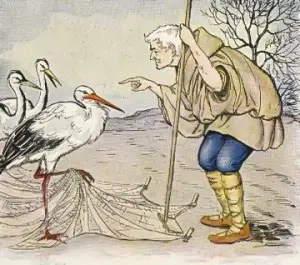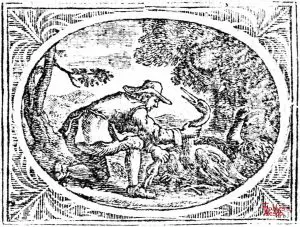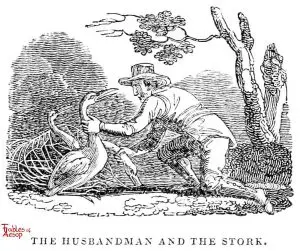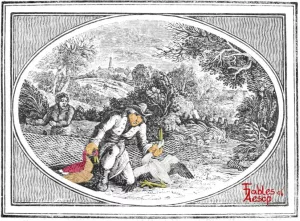A Farmer set nets to catch Cranes which ate seed. A Stork was with the Cranes. The Stork plead for his life. The Farmer said he gets the same punishment.
Birds of a feather flock together.
A Farmer set nets to catch Cranes which came to eat his seed. When he came to the net he found a Stork in with the Cranes. The Stork plead for his life citing his service to humanity and good character. The Farmer, however, laughed and said, “You were traveling with these robbers and so must meet their fate.”

Aesop For Children (The Farmer and The Stork)
A Stork of a very simple and trusting nature had been asked by a gay party of Cranes to visit a field that had been newly planted. But the party ended dismally with all the birds entangled in the meshes of the Farmer’s net.
The Stork begged the Farmer to spare him.
“Please let me go,” he pleaded. “I belong to the Stork family who you know are honest and birds of good character. Besides, I did not know the Cranes were going to steal.”
“You may be a very good bird,” answered the Farmer, “but I caught you with the thieving Cranes and you will have to share the same punishment with them.”
Moral
You are judged by the company you keep.

Townsend version
A farmer placed nets on his newly-sown plowlands and caught a number of Cranes, which came to pick up his seed. With them he trapped a Stork that had fractured his leg in the net and was earnestly beseeching the Farmer to spare his life. “Pray save me, Master,” he said, “and let me go free this once. My broken limb should excite your pity. Besides, I am no Crane, I am a Stork, a bird of excellent character; and see how I love and slave for my father and mother. Look too, at my feathers–they are not the least like those of a Crane.” The Farmer laughed aloud and said, “It may be all as you say, I only know this: I have taken you with these robbers, the Cranes, and you must die in their company.”
Moral
Birds of a feather flock together.

Samuel Croxall (The Husbandman and the Stork)
THE Husbandman pitched a net in his fields to take the Cranes and Geese which came to feed upon the new-sown corn. Accordingly, he took several, both Cranes and Geese; and among them a Stork, who had pleaded hard for his life, and, among other apologies which he made, alleged, that he was neither Goose nor Crane, but a poor harmless Stork, who performed his duty to his parents to all intents and purposes, feeding them when they were old, and, as occasion required, carrying them from place to place upon his back. All this may be true, replies the Husbandman; but as I have taken you in bad company, and in the same crime, you must expect to suffer the same punishment.
THE APPLICATION
If bad company had nothing else to make us shun and avoid it, this, methinks, might be sufficient, that it infects and taints a man’s reputation to as great a degree as if he were thoroughly versed in the wickedness of the whole gang. What is it to me, if the thief, who robs me of my money, gives part of it to build a church? Is he ever the less a thief? Shall a woman’s going to prayers twice a day save her reputation, if she is known to be a malicious lying gossip? No, such mixtures of religion and sin make the offence but the more flagrant, as they convince us, that it was not committed out of ignorance. Indeed, there is no living without being guilty of some faults, more or less: which the world ought to be too good-natured enough to overlook, in consideration of the general frailty of mankind, when they are not too gross and, too abundant. But, when we are so abandoned to stupidity, and a neglect of our reputation, as to keep bad company, however little we may be criminal in reality, we must expect the same censure and punishment as is due to the most notorious of our companions.

JBR Collection
A Husbandman set a net in his fields, to take the Cranes and Geese which came to feed upon the newly-springing corn. He took several, and with them a Stork, who pleaded hard for his life, on the ground that he was neither a Goose nor a Crane, but a poor, harmless Stork. “That may be very true,” replied the Husbandman; “but as I have taken you in bad company, you must expect to suffer the same punishment.”


Thomas Bewick (The Husbandman and The Stork)
A Husbandman having placed nets in his fields to catch the Rooks and the Geese, which came to feed upon the new-sown corn, found among his prisoners a single Stork, who happened to be in their company. The Stork pleaded hard for his life, and among other arguments, alleged that he was neither Goose nor Crow, but a poor harmless Stork, whose attachment to mankind, and his services to them in picking up noxious creatures, as well as fulfilling his duties to his aged parents, he trusted, were well known. All this may be true, says the Husbandman, for what I know; but as I have taken you in company with thieves, and in the same crime, you must also share the same fate with them.
APPLICATION.
When we become abandoned to stupidity and a disregard of our reputation, as to keep bad company, however little we may be criminal in reality, we must expect the same censure and punishment as is due to the most notorious of our companions. The world will always form an idea of the character of every man from his associates: nor is this rule founded on wrong principles; for, generally speaking, those who are constant companions, are either drawn together by a similitude of manners and principles, or form such a similitude by daily commerce and conversation. If, therefore, we are tender of our reputation, we should be particularly delicate in the choice of our company, since some portion of their fame or infamy must unavoidably be reflected upon us. It is not enough to be virtuous ourselves, but we must be cautious not to associate with those who are devoted to vice: for, though we cannot confer any degree of our own credit upon them, we may suffer much discredit, and incur much danger, from mixing with such bad companions.
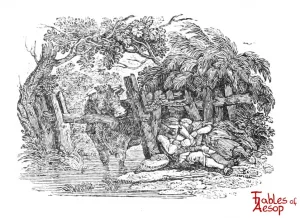
L’Estrange version
A poor innocent stork had the ill hap to be taken in a net that was layd for geese and cranes. The storks plea for her self was simplicity, and piety: the love she bore to mankind, and the service she did in picking up of venomous creatures. This is all true, says the husbandman; but they that keep ill company, if they be catch’d with ill company, must expect to suffer with ill company.
Moral
‘Tis as much as a man’s life, fortune, and reputation, are worth, to keep good company (over and above the contagion of lewd examples) for as Birds of a feather will flock together, so if the good and the bad be taken together, they must expect to go the way of all flesh together.

Ciconia a Rustico Capta
Rusticus quidam anseribus et gruibus, quae semper nascentia germina devorabant, laqueos in agro posuerat. Cum vero ciconia etiam una cum illis in pedicas incidisset sibique pes alter diffractus esset, his agricolam, ut liberam dimitteret, orare coepit, “Me quaeso, vir, serva immunemque dimitte, teque mei claudicantis miseratio tangat. Nuper enim huc advolavi, neque grus ego sed ciconia sum, omnium quidem avium pientissima, quippe quae parentibus inservio singulisque eorum necessitatibus prospicio.” Agricola vero, in risum vehementer effusus, “Satis,” inquit, “et ego te novi, mihique ignota non es; scio praeterea, qui tui mores sint. Sed cum illis te cepi, cum illis quoque morieris.”
Perry #194
